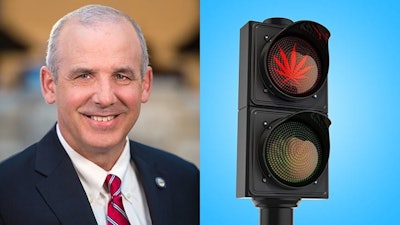
All six states that have legalized adult-use cannabis through legislative action, as opposed to ballot initiatives, have done so via Democratic-controlled legislatures.
The Republican-controlled Ohio General Assembly doesn’t plan on breaking that trend any time soon.
Ohio Senate President Matt Huffman, R-Lima, told reporters Feb. 9 that he won’t act on calendaring a proposal to legalize adult-use cannabis for floor debate in his chamber, The Columbus Dispatch reported.
“I don’t want anybody to misunderstand my position,” Huffman said. “I’m not going to bring it to the Senate floor. And if that means people want to go put it on the ballot, have at it.”
Republicans hold a 25-8 majority in the Ohio Senate and a 64-35 majority in the House.
The legalization proposal stems from a citizen-led effort by the Coalition to Regulate Marijuana Like Alcohol (CRMLA), which met a 132,877-signature threshold to put its petition before state lawmakers, the Ohio Secretary of State announced last month.
The coalition’s proposed statute seeks to allow adults 21 and older to buy and possess up to 2.5 ounces of cannabis (or 15 grams of extract) and grow up to six plants per person or 12 plants per household. In addition, the proposal aims to impose a 10% tax on cannabis sales, with revenue going toward state costs to run a legalized program; substance abuse and addiction treatment programs; supporting municipalities with dispensaries; and social equity and jobs programs.
RELATED: Group Launches Effort to ‘Regulate Marijuana Like Alcohol’ in Ohio
“It replaces prohibition with a sensible framework for regulation and taxation,” CRMLA spokesman Tom Haren told Cannabis Business Times in August, adding that the proposed law will generate an estimated $400 million in new tax revenue. “It utilizes the existing medical marijuana infrastructure to provide a quick path to legal sales to adults that will provide an alternative for Ohio consumers to the unregulated market or spending their money out of state.”
Meeting the signature-gathering benchmark ahead of a Jan. 14 deadline, CRMLA enacted a four-month timeline for the Ohio General Assembly to consider the proposal (or an amended version of the proposal).
As recently as last month, Ohio Republican Gov. Mike DeWine said he opposes legalizing adult-use cannabis. That veto threat paired with the GOP’s firm majority in the General Assembly makes legislative action unlikely this year—17 senators could sign a discharge petition to force the issue be heard on the floor, going against Huffman’s wishes, but at least nine Republican senators would have to be on board.
If state lawmakers do not enact the coalition’s proposal, or an amended version, within the four-month timeframe, then CRMLA officials could collect an additional 132,877 signatures (265,754 total) by early July for the opportunity to present the issue to Ohio voters on the Nov. 8, 2022, ballot.
CRMLA spent roughly $1.1 million during the first round of its signature-gathering effort, Ohio Capital Journal reported. Cannabis advocacy group Marijuana Policy Project contributed nearly $700,000, while several medical cannabis businesses contributed another $600,000.
The last time an adult-use cannabis proposal was put before Ohio voters in November 2015, they rejected the issue with 63.6% casting ballots against it.
Virtually every major Ohio newspaper—from Cleveland and Toledo to Cincinnati and Columbus to Akron, Canton and Youngstown—opposed the measure, objecting that it would create a monopoly, citing the ballot issue’s call for 10 growing sites across the state. But that number could have increased to more than 1,100 retail licenses to meet future demand under the issue, and an unlimited number of home growers could have been licensed.
Six years have passed without another adult-use ballot measure in the state since then.


























